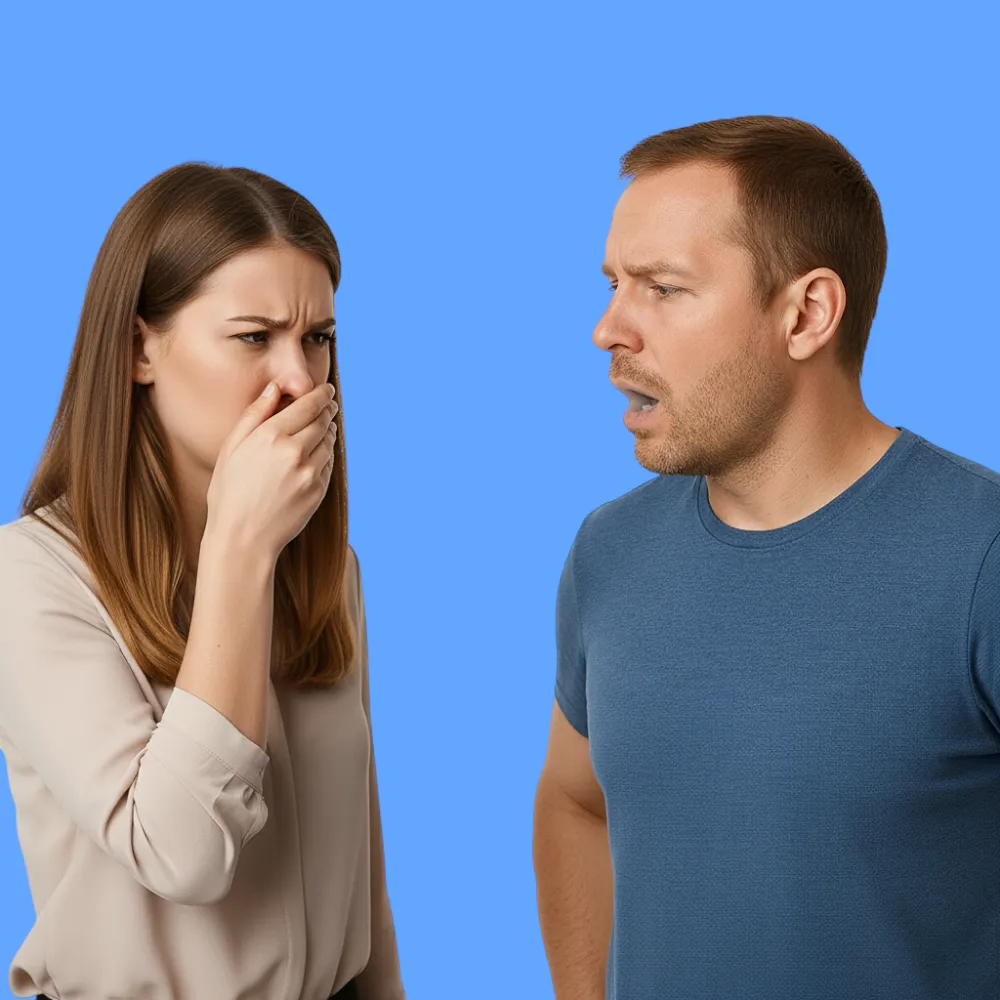What is bad breath?
Bad breath is a common problem that causes embarrassment for many people and often occurs due to the buildup of bacteria in the mouth or other health factors such as dry mouth or gum disease.
This condition may be temporary and disappear with improved daily habits, or it can be chronic, indicating deeper health issues that require medical intervention and precise tests to identify the cause and treat it properly.
Causes of bad breath
The most common causes of bad breath include:
- Bacterial buildup on teeth and tongue due to poor oral hygiene.
- Eating foods with strong odors such as garlic and onions.
- Smoking and using tobacco products.
- Dry mouth caused by reduced saliva production.
- Gum disease or tooth decay.
- Certain medications that decrease saliva flow.
- Respiratory or sinus infections.
- Stomach disorders such as acid reflux.
Symptoms of bad breath

Common symptoms that patients may experience include:
- Unpleasant odor when breathing or speaking.
- Strange or bitter taste in the mouth.
- Persistent dry mouth.
- White coating on the tongue.
- Bleeding or swollen gums.
- Feeling unrefreshed even after brushing teeth.
How is bad breath diagnosed?
Bad breath is usually diagnosed through a breath odor examination by a doctor, who may use special tools to measure sulfur compounds that cause unpleasant smells.
In some cases, a comprehensive evaluation is performed, including checking teeth, tongue, and gums, and additional tests may be requested to rule out chronic diseases or digestive and respiratory disorders.
Treatment for bad breath
Several methods can help treat bad breath, including:
- Improving oral hygiene with brushing, flossing, and mouthwash.
- Treating gum or dental problems with professional care.
- Drinking plenty of water to reduce dry mouth.
- Quitting smoking and tobacco products.
- Using antibacterial mouth rinses.
- Adjusting diet to reduce strong-smelling foods.
- Treating underlying health conditions such as reflux or sinus infections.
When should you see a doctor?
You should seek medical advice promptly if you experience:
- Persistent odor despite good oral care.
- Bleeding or swollen gums.
- Tooth pain or sensitivity.
- Severe dry mouth that does not improve.
- Appearance of spots or ulcers in the mouth.
- Unexplained weight loss.
- Frequent reflux symptoms or digestive issues.
Tips to prevent bad breath
Recommended preventive measures include:
- Brushing teeth twice daily and using dental floss.
- Cleaning the tongue regularly to remove bacteria.
- Drinking enough water every day.
- Avoiding smoking and alcohol.
- Eating a balanced diet rich in fruits and vegetables.
- Visiting the dentist regularly.
- Using suitable mouth rinses.
Frequently Asked Questions
Is bad breath related to stomach problems?
Yes it can be caused by acid reflux.
Can medications cause bad breath?
Some medications reduce saliva flow, which leads to odor.
Does mouthwash cure bad breath permanently?
It helps temporarily but does not treat the root cause.
Does smoking worsen bad breath?
Yes significantly.
Article Summary
Bad breath is a common condition that may be temporary or chronic, often resulting from bacterial buildup or dental and digestive issues.
It can be managed through proper oral hygiene, dietary adjustments, and medical consultation when symptoms persist, along with preventive measures to maintain fresh breath.